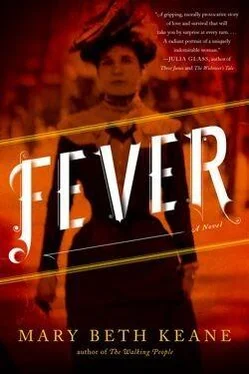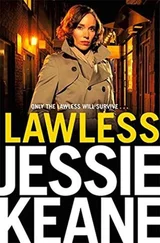When he opened his eyes again there was a nurse looking at him from behind a clipboard. He opened and closed his eyes several times. Sometimes it was light in the room, sometimes dark. Sometimes a man was watching him, sometimes a woman, usually no one at all. In the background there were sounds: shoes scuffing a linoleum floor, people talking in low voices, the squeaking wheels of a rolling cart. But instead of interrupting the silence, the atmosphere of total stillness, of nothingness, that sensation of floating through an in-between place, the noises only emphasized the void, drew attention to it, and after every small bump or rattle the world seemed even quieter than before.
Several times a day, from somewhere so near his body he knew he could reach out and touch it if he could make his body work, was the delicate tink of glass, and the unmistakable flick of a finger, once, twice, and then a pinprick, usually in the crook of his elbow, sometimes in his forearm, occasionally the back of his hand. After a moment — one, two, three — he felt a small quiver at his center, pressure on his chest and head that lasted just long enough for him to begin feeling panic, and then peace, as if someone had warmed a blanket by the stove and pulled it up over him, tucked it in at his shoulders and turned out the light. It was a feeling like being born, a baby tucking chin to chest and pushing into that dark tunnel, or the lead weight used to plumb a depth, and the prize was reaching that destination, finding the depth, and sometimes he felt the sea rocking under his bed. He heard the sound of the ocean. He heard his mother’s voice, took in the smell of the Alps, German grass under his feet, German air. Then, as if he’d taken one giant leap across a continent and ocean, he was in New York, a mountain of coal behind him, Mary on the other side of a gate, Mary stirring a pot with her back to the room, Mary unpinning her hair and shaking it loose. He spoke to his father. He spoke to his brother. He laughed with Mary as they danced in Coney Island, in Hoboken, in Manhattan. He whisked her across the gleaming black-and-white floor of his hospital room. He was seven years old and there were thin slices of pine strapped to his feet. He was fifteen and strong, dodging a policeman on Mercer. He was forty and tired, but summoning the strength to get up and start again.
Eventually, there were things he knew, and so somebody must have told him, though he couldn’t think of who or when. Time stretched and stretched until it snapped: an hour felt like a week, and then a week felt like a day. He knew it was the new year, but then the nurse put a hand on Alfred’s cheek and told him it was the Ides of March. March already. Almost spring. He was in a hospital. He’d been badly burned. There was some question about whether he’d use his right arm again: everything below the elbow had been destroyed almost to the muscle. His upper chest on that side was in better shape, but there was still a risk of infection. Had he spoken to them? They asked him questions sometimes, and waited for answers. How do you feel? What exactly happened? Don’t you know how lucky you are?
They fed him. They washed his body. Catholic? He’d nodded, yes, he guessed he probably was, but had he ever been baptized? He’d been to Mass a few times, with Mary and her aunt Kate. A priest came to offer the Eucharist one Sunday and he opened his mouth to accept it. After, he had bad dreams about them finding out and putting him on the street, but he continued to accept it, Sunday after Sunday, and eventually he looked forward to the priest’s visit, the knobby hand he always placed on Alfred’s head before leaving. On Easter Sunday they brought him lamb with mint jelly and fed him in forkfuls small enough for a child. On the Fourth of July they told him to look toward his window, where he could see flashes of blue, pink, bright white sparklers rising up and landing somewhere nearby. He could hear birds, and then, after a few weeks, the birds disappeared. Spring and summer had come and left again.
They told him he was getting better. He had no infection. He’d be able to use his arm one day though it would not be pleasant to look at. His nerves had been badly burned and yes, that was bad news, but on the other hand it meant he wouldn’t feel pain there anymore. He was being moved. It would be uncomfortable but they’d give him something for it.
The burn hospital was uptown, they’d told him. It was a charity hospital, run by nuns, all of whom had vowed to live in service to St. John the Apostle. They didn’t expect anything in return. A donation, perhaps, whatever he could spare. It was in a quiet neighborhood. Quieter than this? He’d asked, and they laughed. “Something for the journey,” the nurse had said, and he closed his eyes to listen for the tink, tink of the little glass vial.
There were trees outside his window at St. John’s. Their shadows swayed on his wall when the wind blew. The nuns wanted him to walk more, to do laps around the hallway. They wanted him to practice lifting a teacup, gripping a fork, washing himself. He complained of itching all over his body. He vomited. He didn’t like it there. He wanted to go back to Willard Parker. They gave him his medicine by tablet — two round white pills three times a day that he placed on his tongue and tipped back into his throat before the nun could pass him a cup of water. The pills helped, eventually, but not like the needle. The needle sent him floating from the very instant it punctured his skin. Syringes were expensive, a nurse explained, and they were a charity hospital. They had to use what they were given: morphine, opium, codeine, cocaine, heroin. Tablets, tinctures, salts for sniffing. It was all the same, all for managing pain. They wanted to be a bit careful about the morphine, they told him. In the past, they’d noticed several patients had difficulty weaning after they were healed. Several doctors suggested cocaine or heroin instead. They usually brought him a tincture of opium after supper, and he swallowed every bitter drop, but he couldn’t sleep in so much silence. The groaning of the trees kept him up all night. It was too cold at St. John’s, and when it wasn’t too cold it was too warm. He was getting worse.
“You are not getting worse,” a nun informed him in a subdued voice. “You have healed wonderfully. It’s been more than ten months since the accident.” He wanted to take her by the shoulders and shake her. Didn’t they realize the extent of his injuries? Even when he finally slept it was not restful, and only when he began howling through the night, waking the other patients, did a harried doctor appear with a needle and syringe. After, he was serene. He slept. They added the nightly injection to his bedtime routine.
He spent afternoons trying to make his way around the corridors and he wondered at his old self, how he always seemed to be on his way somewhere, itching to get free of whatever room he was in. Now, even with so little to do, the days passed quickly and sweetly. He walked. He rested. He considered the shadows on the wall. He closed his eyes and listened. He returned to his room for his medicine and noted that he never had to even look at a clock. His body told him when it was time, and sure enough, usually within a minute of returning to his room, resting at the edge of his bed, someone would appear with a white cup, and he took anything they gave him as he anticipated the after-supper hour when the doctor would appear with the syringe.
In November, they told him he was ready, that he should start planning. Was there a job to get back to? Someone to contact? Crystal Springs had given him a settlement of one hundred dollars, which by some miracle the hospital hadn’t taken from him. He left twenty-five dollars to the nuns. On the morning of his discharge they shaved him, cut his hair, gave him a suit of clothes, a hat, shoes, a small container of tablets for the pain. A doctor named Tropp who kept hours at the hospital, and had his own office nearby, would prescribe something else if the tablets didn’t do the job. If he ran out of medicine and Dr. Tropp was unavailable, he should go to a pharmacy and ask for something. Any druggist would give him a tincture of opium or a small dose of heroin until the doctor could see him.
Читать дальше












